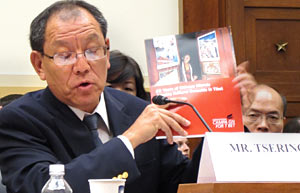
ICT’s Bhuchung Tsering testifies to the House Committee on Foreign Affairs regarding China’s human rights abuses on July 25.
Tsering spoke of the message of the self-immolators in Tibet, and showed the committee a poster featuring the faces and names of the 44 Tibetans who have set themselves on fire. He said human rights conditions “from a Tibetan perspective have certainly worsened.”
Testifying a day after Chinese officials were in Washington to participate in the latest U.S.-China Human Rights Dialogue, Tsering welcomed “such initiatives as they reflect the concern of the American public about the situation in Tibet,” but said “we believe the U.S. Congress and Administration… need to be more proactive.”
Responding to the hearing’s focus on Chinese threats, Tsering offered the following recommendations to the Committee:
- pass H.Res. 609, the Tibet resolution, and update the Tibetan Policy Act;
- ask Assistant Secretary Michael Posner to provide a public readout of the Human Rights Dialogue;
- challenge the news blackout in Tibet by funding the Voice of America and Radio Free Asia, expand consular outreach in Tibetan areas, and open a U.S. consulate in Lhasa;
- impose travel restrictions on Chinese delegations as long as travel to Tibet is restricted;
- investigate China’s interference in the internal affairs of Nepal regarding its Tibetan residents;
- Investigate Confucius Institutes and whether they limit free speech on topics such as Tibet; and
- Promote a regional framework on water security regarding rivers that flow from the Tibetan Plateau.

